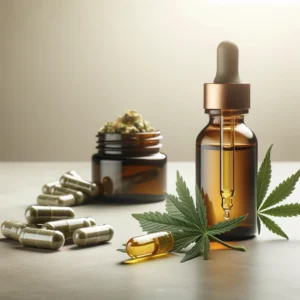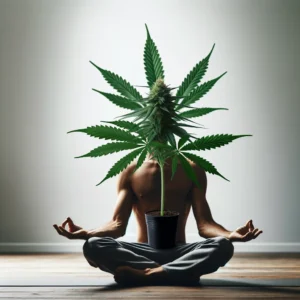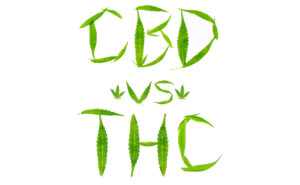 Cannabis has long been a subject of interest and controversy in modern health discussions, particularly when it comes to mental health. Its potential to affect mood, stress levels, and overall psychological well-being has led to numerous anecdotal reports and a growing body of scientific research. For many, cannabis represents a hope of managing anxiety and depression, conditions that annually affect millions worldwide.
Cannabis has long been a subject of interest and controversy in modern health discussions, particularly when it comes to mental health. Its potential to affect mood, stress levels, and overall psychological well-being has led to numerous anecdotal reports and a growing body of scientific research. For many, cannabis represents a hope of managing anxiety and depression, conditions that annually affect millions worldwide.
But can it really help, and if so, how should we approach this complex relationship? In this in-depth exploration, we’ll dissect the topic of cannabis and its role in managing anxiety and depression.
The Anecdotal Evidence vs. Scientific Basis
Before we wade into the scientific waters, it’s important to acknowledge the anecdotal evidence which is often the first ripple in the lake of scientific discovery. Cannabis users often report experiences of relief from anxiety or depression, particularly when consuming strains high in CBD, the non-psychoactive compound of cannabis.
Anxiolytic CBD
CBD continues to gain traction as a promising anxiolytic agent. Numerous users tout the calming benefits of CBD-dominant strains, oils, and edibles. Unlike THC, CBD doesn’t elicit the typical ‘high’ but still provides a sense of relaxation, which can be appealing for those seeking relief from anxiety without the impairment.
The Psychotropic Challenge of THC
On the flip side, THC, the psychoactive component of cannabis, is a more complex character when it comes to anxiety. While it may provide some with euphoric states that combat depressive symptoms, it could also trigger or exacerbate feelings of anxiety or paranoia, especially at high doses or in individuals more susceptible to these conditions.
The Patchwork of Research on Cannabis and Depression
 The relationship between cannabis and depression is trickier to pin down. While some users may find temporary reprieve from depressive symptoms, the evidence for it being a long-term solution is far from conclusive.
The relationship between cannabis and depression is trickier to pin down. While some users may find temporary reprieve from depressive symptoms, the evidence for it being a long-term solution is far from conclusive.
The Challenge of Causation and Correlation
Studies often struggle to establish a clear cause-and-effect relationship between cannabis use and depression. Does cannabis help alleviate depression, or do people with depressive symptoms simply turn to cannabis as a form of self-medication? The answer isn’t as straightforward as we might wish.
The Endocannabinoid System and Emotional Regulation
Within our bodies, we each have an endocannabinoid system, which plays a crucial role in mood regulation. Cannabis interacts with this system, potentially influencing how our brains manage stress and emotional responses. What remains uncertain is whether this can be harnessed as a reliable treatment pathway for depression.
The Mosaic of Individual Reactions
Not all cannabis experiences are created equal. A multitude of factors can influence how cannabis impacts anxiety and depression, ranging from the chemical makeup of the strain to the individual’s method of consumption.
Strain Specifics and Mental States
The intricate chemical composition of different strains—which can include various concentrations of THC, CBD, and other cannabinoids—means that not all cannabis is alike. Some users may find that certain strains consistently lift their spirits, while others may cause an unexpected, or unwelcome, downturn.
The Context of Use
The setting in which one consumes cannabis can’t be ignored. Social expectations, mood, physical setting, and even the user’s previous cannabis experiences all play into the mental and emotional effects. A relaxed setting is much more likely to lead to a positive experience than one mixed with stress or uncertainty.
Peering into Long-Term Effects
For those considering cannabis as a tool for managing anxiety or depression, it’s also critical to take stock of the long-term implications. Chronic cannabis use could potentially exacerbate underlying mental health issues or may lead to dependency.
Chronic Use and Mental Health
The research community is actively studying the long-term relationship between cannabis and mental health. While it’s clear that cannabis has the potential to temporarily alter mood and cognition, how this relates to ongoing struggles with anxiety and depression is still being investigated. It’s a cautionary tale that suggests more isn’t always better when it comes to cannabis consumption.
Dependency and Withdrawal
Though not as universally dangerous as certain other substances, cannabis can still lead to dependency, which in turn can intersect with one’s mental state. The cycle of seeking relief in cannabis use and the potential for withdrawal symptoms once it’s removed from the equation are elements of the cannabis-anxiety-depression triad that deserve a closer look.
Seeking Professional Support
The path to managing mental health is a deeply personal one, filled with different treatment modalities. While many may turn to cannabis in this quest, it’s crucial to remember that it’s just one tool in a much larger toolkit.
The Role of Healthcare Providers
For individuals grappling with anxiety or depression, consulting with a healthcare provider is an indispensable step. Self-medicating with cannabis may not address the root causes of these conditions and could potentially lead to adverse effects.
Comprehensive Treatment Plans
Professionals will often recommend a multi-faceted approach to tackling anxiety or depression. This could include therapy, lifestyle adjustments, and possibly medications. The addition of cannabis to this mix should be approached with a great deal of thought and in-depth consultation.
Cannabis as a Complement, Not a Cure
 The landscape of cannabis and its effects on anxiety and depression is nuanced and still very much in flux. While it may provide relief for some, it’s not a panacea. The individual, the strain, and the circumstances together weave a complex tapestry of potential outcomes, not all of which are fully understood.
The landscape of cannabis and its effects on anxiety and depression is nuanced and still very much in flux. While it may provide relief for some, it’s not a panacea. The individual, the strain, and the circumstances together weave a complex tapestry of potential outcomes, not all of which are fully understood.
For those considering cannabis as part of their mental health regimen, the message is clear: tread carefully and be informed. Engage with healthcare providers, monitor your usage, and be mindful of the broader implications. Cannabis, like any substance, is a tool to be wielded with respect and understanding. It is within this framework that individuals can explore its potential benefits in the delicate dance of managing mental health.




